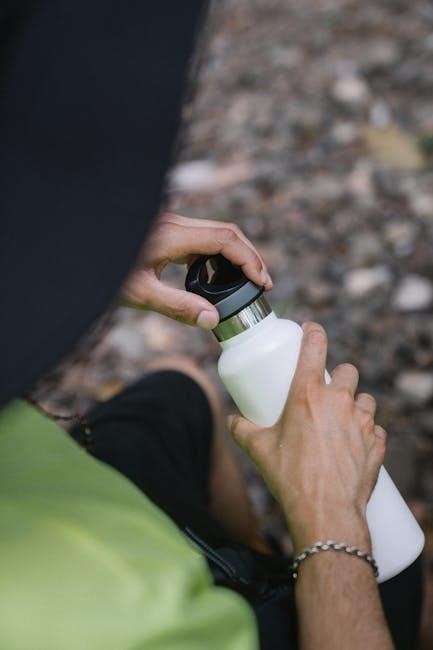
Manual activities are practical, hands-on tasks designed to enhance skill development, therapy, and education․ They include workbooks, guides, and activity sheets for various purposes, offering engaging and structured learning experiences․
1․1 Definition and Purpose of Manual Activities
Manual activities are hands-on tasks designed to enhance skill development, therapy, and education․ They include workbooks, guides, and activity sheets for various purposes, offering structured learning experiences․ These activities aim to improve daily living skills, cognitive abilities, and creativity․ Examples include ADLs, fine motor exercises, and creative projects․ Their purpose is to provide practical engagement, fostering independence and confidence․ They are widely used in therapeutic, educational, and community settings to promote holistic development and skill enhancement․
1․2 Importance of Manual Activities in Skill Development
Manual activities play a crucial role in skill development by providing hands-on experiences that enhance cognitive, motor, and emotional growth․ They help individuals develop coordination, problem-solving abilities, and creativity․ These activities are particularly beneficial for children and individuals with special needs, as they offer structured and repetitive practice․ By engaging in tasks like puzzles, crafts, and daily living exercises, participants build confidence and independence․ Manual activities also foster teamwork and social interaction, making them essential tools in educational and therapeutic settings․ Their versatility ensures they cater to diverse learning needs and goals․
1․3 Overview of Manual Activities in PDF Format
Manual activities in PDF format provide accessible and organized resources for skill development, therapy, and education․ These documents often include worksheets, guides, and activity examples designed for various purposes, such as fine motor exercises, cognitive therapy, and daily living skills․ PDFs are ideal for printing and sharing, making them versatile tools for educators, therapists, and individuals․ They offer structured content, ensuring consistent and engaging learning experiences․ This format is particularly useful for creating customizable plans tailored to individual or group needs, fostering practical and effective skill-building opportunities․

Therapeutic Manual Activities
Therapeutic manual activities include exercises like ADLs, bimanual tasks, and fine motor skills, aiding in rehabilitation and skill development․ They often involve structured worksheets and guides for coordination and cognitive growth․
2․1 Activities of Daily Living (ADLs)
Activities of Daily Living (ADLs) are essential tasks that individuals perform daily to maintain independence and well-being․ Examples include personal care, grooming, and household management․ These activities are often used in therapeutic settings to help individuals develop or regain functional skills․ ADLs are tailored to meet specific needs, such as cooking, cleaning, or self-care routines․ They are documented in guidebooks, like the 2024 ADLs Guidebook, which provides structured exercises and examples for effective skill development․ These activities are crucial for rehabilitation and promoting independence․
2․2 Bimanual Activities for Coordination and Skill Development
Bimanual activities require the use of both hands, enhancing coordination, dexterity, and functional skills․ Examples include tasks like tying shoelaces, cutting paper, or using utensils․ These activities are particularly beneficial for children and individuals in therapy, as they promote cross-midline coordination and fine motor development․ A list of 50 bimanual activities, such as microwaving popcorn or buttoning shirts, provides practical exercises for skill enhancement․ These tasks are documented in guidebooks and workbooks, offering structured approaches to improving coordination and independence․
2․3 Cognitive Behavior Therapy Worksheets
Cognitive Behavior Therapy (CBT) worksheets are tools used to help individuals identify and change negative thought patterns․ They include exercises like thought records, behavioral activation plans, and belief restructuring․ These worksheets, often found in manuals and guides, provide structured activities for self-reflection and skill development․ Resources like Beck’s Cognitive Behavior Therapy: Basics and Beyond offer detailed examples, making them invaluable for therapists and individuals alike․ They are widely used in therapy settings to promote emotional and mental well-being․
2․4 Fine Motor Skill Exercises
Fine motor skill exercises are designed to enhance precision, coordination, and dexterity in hand movements․ Activities include puzzles, drawing, and using small objects․ These exercises are crucial for tasks like writing or tying shoes․ Resources such as activity sheets and workbooks provide structured exercises․ For example, bimanual tasks like buttoning shirts or using scissors improve coordination․ Guides often include step-by-step instructions and progress tracking․ These exercises are essential for skill development, especially in therapeutic and educational settings, and are widely available in PDF formats for easy access․

Educational Manual Activities
Educational manual activities include lesson plans, creative projects, and hands-on learning tasks․ These activities enhance academic engagement and skill development through structured, interactive exercises and worksheets․
3․1 Lesson Plans for Classroom Engagement
Lesson plans are structured frameworks designed to enhance classroom engagement through interactive and meaningful activities․ They often include activity sheets, comprehension questions, and hands-on tasks aligned with educational standards․ These plans promote critical thinking, creativity, and collaboration among students․ For example, a lesson might incorporate a warm-up activity, followed by group exercises and reflective discussions․ Such structured approaches ensure students stay focused and motivated, fostering a dynamic learning environment․ Teachers can customize these plans to suit different age groups and learning objectives, making them versatile tools for effective education․
3․2 Creative Projects for Skill Development
Creative projects are essential for fostering skill development through hands-on activities․ These projects include arts, crafts, and DIY tasks that encourage imagination and practical application․ For instance, students can create game tools for learning colors and numbers, or engage in collaborative art pieces that promote teamwork․ Such activities not only enhance creativity but also develop fine motor skills and problem-solving abilities․ They provide a fun and engaging way for learners to explore new concepts while producing tangible outcomes, making learning both enjoyable and effective․ These projects are adaptable to various age groups and skill levels, ensuring inclusivity and personalized growth․
3․3 Hands-On Learning Activities
Hands-on learning activities are interactive tasks that engage students through practical experiences․ These activities, such as interactive science experiments or math puzzles, encourage active participation and deeper understanding․ By allowing students to explore concepts physically, these tasks enhance retention and problem-solving skills․ Examples include creating game tools for learning colors and numbers or collaborative art projects that promote teamwork․ These activities cater to diverse learning styles, ensuring that all students can engage meaningfully and develop skills in a dynamic and enjoyable manner․
3․4 Worksheets for Academic Skill Enhancement
Worksheets are essential tools for reinforcing academic skills, offering structured exercises for subjects like math, reading, and science․ Available in PDF format, these resources provide clear instructions and practical tasks to enhance understanding․ Examples include algebra practice sheets, comprehension exercises, and science problem sets․ Designed for various age groups, they cater to different learning needs, making them adaptable for both classroom and home use․ Worksheets help students refine their skills, build confidence, and achieve academic success through consistent practice and feedback․

Life Skills Development Activities
Life skills development activities focus on building independence through practical tasks․ Examples include personal care routines, household management, and community integration exercises․ These activities enhance daily living skills and promote self-reliance, with resources like guides and manuals available in PDF formats to support learning and implementation․
4․1 Personal Care and Grooming Activities
Personal care and grooming activities are essential for maintaining hygiene and independence․ Examples include brushing teeth, washing hands, and using utensils․ These tasks are often outlined in guidebooks or manuals, providing step-by-step instructions․ Resources like the Activities of Daily Living Guidebook offer practical tools to teach these skills․ Such activities are vital for individuals to develop self-care routines, promoting confidence and self-reliance․ Manuals and workbooks in PDF formats are widely available, offering structured approaches to mastering these everyday tasks․
4․2 Household Management Tasks
Household management tasks involve practical activities for maintaining a clean and organized living space․ Examples include laundry, meal preparation, and cleaning․ These tasks are often detailed in manuals and guides, such as the Life Skills Manual, which provides structured exercises․ Resources in PDF format offer step-by-step instructions, making it easier to learn and implement these skills․ Engaging in these activities helps build responsibility and independence, essential for daily living․ Manuals also include tips and tricks for efficient household management, catering to various skill levels․
4․3 Community Integration Activities
Community integration activities focus on fostering social connections and participation in group settings․ Examples include group games, volunteer work, and social interaction tasks․ These activities, often detailed in manuals and guides, aim to enhance teamwork and communication skills․ Resources like Life Skills Manuals provide structured exercises for building confidence in community environments․ Such tasks encourage individuals to engage actively, promoting a sense of belonging and responsibility․ These activities are essential for developing interpersonal skills and adapting to social norms․
4․4 Independent Living Skill Exercises
Independent living skill exercises empower individuals to manage daily tasks confidently․ These activities, often outlined in manuals and guides, include household management, personal care, and meal preparation․ Resources like the Life Skills Manual provide structured exercises to enhance self-reliance․ Examples include budgeting, cooking, and time management, all designed to foster autonomy․ These exercises are essential for building confidence and ensuring individuals can thrive independently, with many resources available in PDF formats for easy access․

Creative Manual Activities
Creative manual activities include arts, crafts, and DIY projects that foster imagination and skill development․ They are detailed in PDF guides, offering step-by-step instructions for engaging hands-on tasks․
5․1 Arts and Crafts Projects
Arts and crafts projects are essential components of creative manual activities, fostering imagination and fine motor skills․ These projects, often detailed in PDF guides, include painting, drawing, and DIY crafts․ They provide step-by-step instructions, making them accessible for all skill levels․ Such activities encourage self-expression and can be adapted for therapeutic or educational purposes․ Examples include painting exercises, sewing, and knitting, which are outlined in resources like the NHS Self-Help Guides and Cognitive Behavior Therapy workbooks․ These manuals offer practical tasks for hands-on engagement and skill development․
5․2 DIY (Do-It-Yourself) Crafts
DIY crafts are hands-on projects that encourage creativity and self-sufficiency, often detailed in PDF guides․ These activities range from simple to complex, catering to all skill levels․ Examples include crafting game tools for children, creating decorative items, and upcycling materials․ DIY projects enhance problem-solving skills and provide a sense of accomplishment․ Resources like free printable workbooks and life skills manuals offer step-by-step instructions, making these activities accessible and enjoyable for individuals of all ages․ They are ideal for fostering creativity and practical skills․
5․3 Painting and Drawing Exercises
Painting and drawing exercises are creative manual activities that foster artistic expression and fine motor skills․ These exercises, often detailed in PDF guides, include techniques like color mixing, shading, and sketching․ They are ideal for therapy, education, and personal enjoyment․ Resources such as cognitive therapy workbooks and life skills manuals incorporate these exercises to enhance creativity and emotional well-being․ By providing structured yet flexible activities, painting and drawing exercises offer a rewarding outlet for self-expression and skill development across all age groups and skill levels․
5․4 Sewing and Knitting Activities
Sewing and knitting are manual activities that involve creating items with fabric and yarn․ These activities are used for therapy, skill development, and personal projects․ They improve fine motor skills, hand-eye coordination, and cognitive function․ Resources like PDF guides provide patterns, tutorials, and exercises for various skill levels, making them accessible for everyone․ These activities can be adapted for different age groups, from simple knitting patterns for children to complex sewing projects for adults, enhancing creativity and providing a therapeutic outlet․

Community-Based Manual Activities
Community-based manual activities involve group games, outdoor tasks, and volunteer projects that foster teamwork, physical development, and social interaction․ These activities enhance community engagement and skill development․
6․1 Group Games and Team-Building Exercises
Group games and team-building exercises are essential components of community-based manual activities․ They promote collaboration, communication, and mutual understanding among participants․ Activities such as icebreakers, problem-solving challenges, and collaborative puzzles are widely used․ These exercises help individuals develop leadership skills, trust, and camaraderie․ They are often incorporated into educational and therapeutic settings to enhance social interactions and create a supportive environment․ By fostering teamwork, these activities contribute to personal growth and stronger community bonds․ They are versatile and can be adapted to various age groups and settings․
6․2 Outdoor Activities for Physical Development
Outdoor activities are vital for physical development, offering fresh air and exercise․ They include games like tag, soccer, and scavenger hunts, which improve coordination and stamina․ These activities also promote mental well-being by reducing stress and fostering a connection with nature․ Organized sports and hikes encourage teamwork and exploration, while individual pursuits like cycling or swimming enhance personal fitness․ Such activities are often included in manuals and guides, providing structured plans for effective physical development in various settings, from schools to community programs․ They are essential for holistic growth․
6․3 Volunteer Work and Service Projects
Volunteer work and service projects are essential for fostering empathy and social responsibility․ They include community clean-ups, food drives, and mentoring programs, which encourage active participation and teamwork․ These activities, often detailed in manuals and guides, provide opportunities for individuals to contribute to society while developing life skills․ Service projects also enhance personal growth by promoting a sense of purpose and fulfillment․ They are widely recognized as valuable tools for building stronger, more compassionate communities and are frequently recommended in educational and therapeutic resources․
6․4 Social Interaction Tasks
Social interaction tasks are designed to improve communication and relationship-building skills․ Activities like group games, role-playing, and icebreakers encourage collaboration and empathy․ These tasks, often outlined in manuals and PDF guides, help individuals develop confidence in social settings․ They are particularly beneficial for fostering teamwork and understanding diverse perspectives․ By engaging in these activities, participants can enhance their ability to connect with others, leading to stronger social bonds and improved interpersonal dynamics․ These tasks are widely used in educational and therapeutic settings to promote social competence․


Resources and Workbooks
This section provides access to free printable workbooks, NHS self-help guides, and cognitive therapy resources․ These materials offer practical tools for skill development and therapy exercises․
7․1 Free Printable Workbooks and Guides
Free printable workbooks and guides are versatile tools for skill development and therapy․ They include activity sheets, lesson plans, and exercises tailored for various needs․ These resources are easily accessible online, offering structured and engaging tasks․ Many guides focus on ADLs, fine motor skills, and cognitive development․ They are ideal for educators, therapists, and parents seeking hands-on materials․ Popular examples include NHS self-help guides and 12-step workbooks, providing comprehensive support for personal growth and learning․ These resources are often downloadable in PDF format, ensuring convenience and accessibility for users․
7․2 NHS Self-Help Guides
NHS self-help guides are excellent resources for managing mental health and daily challenges․ Available in PDF format, they cover topics like stress, anxiety, and alcohol use, offering practical strategies and exercises․ These guides are designed to be user-friendly, providing step-by-step advice and activities to promote well-being․ They are ideal for individuals seeking self-management tools and professionals guiding clients․ With a focus on cognitive behavioral techniques, these guides empower users to take control of their mental health through structured and accessible content․ They are widely recommended for their effectiveness and ease of use․
7․3 Cognitive Therapy Workbooks
Cognitive therapy workbooks are essential tools for addressing mental health challenges․ They include structured exercises and activities designed to help individuals identify and change negative thought patterns․ These workbooks, often available in PDF format, provide practical strategies for managing conditions like anxiety and depression․ Based on evidence-based techniques, they guide users through self-reflection and skill-building activities․ Many workbooks reference renowned authors like Beck, ensuring a comprehensive approach to cognitive behavioral therapy․ They are valuable resources for both personal use and professional therapy sessions․
7․4 Life Skills Manuals
Life skills manuals provide practical guidance for developing essential daily living skills․ They often include structured activities and exercises focused on personal care, household management, and community integration․ These manuals are designed to help individuals gain independence and confidence in managing everyday tasks․ Examples include guides for teaching personal care routines, household chores, and safety awareness․ Many manuals are adaptable to different skill levels, offering step-by-step instructions and worksheets to reinforce learning․ They serve as valuable resources for educators, therapists, and individuals seeking to improve life skills․

Examples of Manual Activities
Manual activities include bimanual tasks, fine motor exercises, and daily living skills․ Examples like ADLs, cognitive worksheets, and creative projects are detailed in PDF guides and workbooks․
8․1 Bimanual Activities Examples
Bimanual activities require the use of both hands, enhancing coordination and dexterity․ Examples include tying shoelaces, cutting paper with scissors, and clapping hands․ These tasks are essential for skill development and are often used in therapeutic settings to improve motor function․ They can be adapted for different age groups and skill levels, making them versatile tools for education and rehabilitation․ Many resources, such as PDF guides, provide detailed lists of bimanual activities suitable for various needs and goals․
8․2 ADLs Examples
Activities of Daily Living (ADLs) are essential tasks that individuals perform daily to maintain independence․ Examples include personal care activities like brushing teeth, washing hands, and dressing․ Household tasks such as cooking, cleaning, and laundry are also ADLs․ Additionally, community-based activities like shopping, managing finances, and using public transportation are included․ These tasks are fundamental for daily functioning and are often used in therapeutic and educational settings to promote skill development and independence․ Many PDF guides provide detailed lists of ADLs tailored for various age groups and abilities․
8․3 Cognitive Behavior Therapy Examples
Cognitive Behavior Therapy (CBT) worksheets and exercises are designed to help individuals identify and change negative thought patterns․ Examples include exercises like “Exploring My Readiness” and “Developing My Confidence,” found in workbooks such as Beck’s Cognitive Behavior Therapy: Basics and Beyond․ These activities guide users through self-assessment and skill-building processes․ Practical tasks like thought recording and behavioral activation are also common, aiding in the management of mental health challenges․ These resources are widely available in PDF formats, offering structured approaches to cognitive and emotional growth․
8․4 Fine Motor Skill Examples
Fine motor skill activities focus on enhancing hand-eye coordination and dexterity․ Examples include using manipulatives like beads or buttons, coloring within lines, and puzzles․ Activities such as cutting shapes with scissors or tracing patterns are also common․ These exercises are often found in workbooks and guides, designed to help individuals, especially children, improve their precision and control․ Fine motor skill exercises are essential for everyday tasks and are widely available in PDF formats for easy access and practice․
Manual activities provide versatile tools for skill development, therapy, and education, offering practical and engaging exercises․ Their accessibility in PDF formats makes them widely effective for various needs․
9․1 Summary of Manual Activities
Manual activities encompass a wide range of practical, hands-on tasks designed to enhance skill development, therapy, and education․ These activities, often provided in PDF formats, include workbooks, guides, and exercise sheets tailored for various purposes․ From Activities of Daily Living (ADLs) to cognitive behavior therapy worksheets, they offer structured approaches for personal growth and learning․ Examples include fine motor skill exercises, creative projects, and bimanual coordination tasks․ These resources are invaluable for educators, therapists, and individuals seeking engaging and effective tools for development․
9․2 Benefits of Incorporating Manual Activities
Incorporating manual activities offers numerous benefits, including enhanced fine motor skills, improved cognitive function, and boosted creativity․ These tasks promote independence, self-confidence, and practical problem-solving abilities․ They also serve as therapeutic tools, aiding in stress relief and emotional well-being․ Manual activities, such as those found in PDF guides, provide structured yet engaging ways to develop life skills․ Whether for education, therapy, or personal growth, these activities foster a sense of accomplishment and provide a foundation for lifelong learning and development․ Their versatility makes them suitable for diverse age groups and skill levels․
9․3 Encouragement to Explore More Resources
Exploring additional resources for manual activities can significantly enhance your experience and outcomes․ Websites, workbooks, and guides offer a wealth of ideas and tools, such as NHS self-help manuals and cognitive therapy worksheets․ These resources provide structured activities, creative projects, and therapeutic exercises tailored to various needs․ By accessing these materials, you can discover new techniques to improve skills, engage in meaningful tasks, and support personal or educational goals․ Embrace the opportunity to explore these resources and expand your toolkit for effective manual activity implementation․

Further Reading and Resources
For deeper exploration, explore NHS self-help guides, cognitive therapy workbooks, and life skills manuals․ Websites like Beck’s resources and PDF guides offer extensive activity examples and tools․
10․1 Recommended PDF Guides
Recommended PDF guides provide comprehensive resources for manual activities, including workbooks, lesson plans, and activity sheets․ These guides, such as those from the NHS, offer detailed exercises for therapy, education, and skill development․ They include cognitive behavior therapy worksheets, fine motor skill exercises, and life skills manuals․ Additionally, resources like Beck’s cognitive therapy books and activity manuals for teachers are valuable for structured learning experiences․ These PDF guides are accessible and practical for various settings, ensuring engaging and effective skill enhancement․
10․2 Websites for Manual Activity Resources
Websites like the NHS Self-Help Guides and educational platforms offer a wealth of manual activity resources․ These sites provide free printable workbooks, cognitive therapy worksheets, and life skills manuals․ For educators, resources like Teachers Pay Teachers and specialized educational websites offer lesson plans and activity sheets․ Additionally, platforms dedicated to cognitive behavior therapy, such as those referenced in Beck’s works, provide downloadable PDF guides; These websites cater to diverse needs, ensuring accessible and high-quality resources for therapy, education, and skill development․
10․3 Additional Workbooks and References
Beyond the core resources, additional workbooks and references provide in-depth support for manual activities․ The 12 Step Workbook by Al Kohalek and Alcohol and You guides from the NHS offer specialized support․ Educational platforms like Teachers Pay Teachers and Beck’s Cognitive Behavior Therapy books provide extensive activity examples․ These resources, often in PDF format, cater to diverse needs, ensuring comprehensive support for therapy, education, and personal development․ They complement core materials, offering fresh perspectives and tools for effective skill-building and therapy practices․